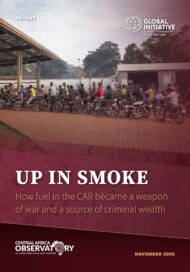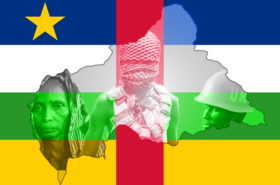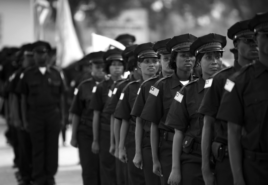Fuel trafficking has long been key to the conflict economy in the Central African Republic (CAR), sustaining armed groups and enabling territorial control. The formal fuel sector remained shielded from such interference, but, amid a major government offensive in 2021 and the onset of the global fuel crisis in 2022, criminal networks within the state and connected private firms have taken control. This shift has also drawn in the Russian Wagner Group, to be rebranded as Africa Corps, the governments primary security partner.
This report examines how fuel in the CAR has become a tool of war and a source of illicit wealth. Based on field interviews, trade data and confidential testimonies, the report exposes how a cartel-like structure, comprising complicit state officials, a monopolistic importer, and security services, has taken hold of fuel imports and distribution, generating between US$17.5 and US$30 million in excess revenues in 2024 alone.
Among the key findings:
- Monopoly control: The fuel sector has been centralized around Neptune Oil, a politically connected Cameroonian company awarded an exclusive 10-year import license in 2023, sidelining all other licensed marketers in violation of existing law.
- Criminal infiltration: The Wagner Group has built a parallel illicit fuel supply chain to support joint operations with CAR’s military and facilitate illegal mining, including its associated gold extraction company, under international sanctions.
- Tax evasion and exemptions: Fuel is imported with inflated premiums and opaque tax regimes, depriving the state of revenue while increasing costs for consumers.
- Confiscated infrastructure: Government-seized fuel stations now distribute both formal and informal fuel, benefiting insiders and operating outside regulatory frameworks.
The report highlights how the CAR’s fuel supply system has become criminalized through opaque pricing, tax irregularities, smuggling, and elite enrichment – all while essential public infrastructure and populations remain underserved, and face fuel prices that rank amongst the highest in the world. The study is part of the mapping project of the Central Africa Observatory, a joint initiative of the Institute for Security Studies (ISS) and the Global Initiative Against Transnational Organized Crime (GI-TOC). The project charts criminal economies and armed violence in the region by identifying the key actors, activities, and sectors driving transnational crime and fueling conflict.
The study recommends urgent reforms, including an independent audit of the fuel sector, strengthened enforcement mechanisms, and international sanctions targeting operators linked to sanctioned entities.
Parti en fumée: Comment le carburant en RCA est devenu une arme de guerre et une source d’enrichissement criminel
Le trafic de carburant occupe depuis longtemps une place centrale dans l’économie de conflit en République centrafricaine (RCA) : il alimente les économies de guerre et permet aux groupes armés de maintenir leur contrôle territorial et de soutenir leurs opérations depuis plus d’une décennie.
Les principales routes formelles d’approvisionnement en carburant du pays – depuis le Cameroun et les deux Congo – sont restées pendant de nombreuses années largement à l’abri des interférences des groupes armés ou de l’armée, notamment grâce aux efforts des forces onusiennes de maintien de la paix. Toutefois, depuis que le gouvernement a lancé une grande offensive militaire contre les groupes armés début 2021, et avec la crise mondiale du carburant qui a suivi en 2022, le secteur formel du carburant est largement passé sous la coupe de groupes criminels à l’intérieur du pays. Ce développement a également abouti à ce que le groupe russe Wagner, plus tard rebaptisé Africa Corps, devienne le principal partenaire du gouvernement en matière de sécurité.
Cette étude révèle comment le contrôle de l’approvisionnement formel en carburant a été consolidé par un groupe restreint de fonctionnaires complices et d’acteurs privés politiquement connectés – nationaux comme étrangers – opérant de manière comparable à un cartel. Ce réseau maintient artificiellement des prix élevés pour maximiser les profits et se soustrait auxobligations fiscales. Sur la base des registres d’importation et des témoignages d’acteurs du commerce du carburant, The Global Initiative Against Transnational Organized Crime (l’Initiative mondiale contre la criminalité organisée transnationale, GI-TOC), a calculé qu’en 2024 ce système avait rapporté entre 17,5 et 30 millions de dollars américains de revenus excédentaires, répartis par le biais d’un système pyramidal de rétrocommissions bien organisé. Parmi les principaux bénéficiaires figuraient des services de sécurité, des acteurs politiques clés liés au parti au pouvoir en RCA et des opérateurs économiques, dont un importateur monopolistique et des stations-service confisquées par le gouvernement. Les principales conclusions du rapport sont les suivantes :
- L’implication de l’État dans la criminalité organisée liée au carburant s’est approfondie avec l’approbation tacite, puis la formalisation, du carburant introduit en contrebande depuis le Nigéria et importé en RCA via le Cameroun. Des autorités étatiques complaisantes taxent de façon irrégulière ce carburant avant sa vente à Bangui, en violation des réglementations en vigueur, renforçant ainsi l’intégration du crime organisé dans l’appareil d’État.
- Le groupe Wagner – sanctionné par l’UE et les États-Unis en tant qu’organisation criminelle transnationale –a mis en place une chaîne d’approvisionnement parallèle et illicite en carburant en RCA pour soutenir de meurtrières opérations militaires conjointes avec les Forces armées centrafricaines (FACA) et faciliter l’exploitation minière illégale. L’une de ses sociétés écrans sert désormais de principal fournisseur de carburant de l’armée, important via le Cameroun. Dans le même temps, bien que les groupes armés aient perdu le contrôle des principaux couloirs de trafic de carburant en provenance du Tchad et du Soudan, ils conservent la capacité de perturber les approvisionnements formels le long du principal corridor camerounais, déstabilisant davantage le secteur.
- Les approvisionnements en carburant russe vers la RCA ont été brièvement interrompus à la suite des sanctions de l’Union européenne sur le pétrole russe en février 2023, les négociants conventionnels s’en tenant à l’écart. Ces expéditions ont toutefois repris ces derniers mois, avec un événement significatif : une cargaison de 30 000 tonnes présentée comme un « don de carburant » de la Russie a été facilitée par le principal importateur camerounais de carburant de la RCA. La cargaison est arrivée au Cameroun à bord d’un navire sanctionné par l’UE et les États-Unis, appartenant à la flotte fantôme russe. Le retour du carburant russe révèle un réseau plus large de contournement des sanctions qui finance l’élite dirigeante tout en approfondissant l’influence étrangère en RCA.
Stabiliser le secteur volatile du carburant en RCA et endiguer les réseaux criminels exige une réponse coordonnée urgente des autorités nationales compétentes avec le soutien total de la présidence. Ce rapport propose comme première étape que le gouvernement centrafricain commande un audit indépendant de la structure opaque de fixation des prix du carburant dans le pays – incluant la divulgation complète des accords d’importation et des exonérations fiscales – afin de mettre en œuvre des politiques publiques correctives pour faire baisser les prix et mettre fin à la perte de fonds publics. Les autorités judiciaires de la RCA, ainsi que celles du Cameroun, devraient ouvrir des enquêtes sur toute responsabilité pénale liée à la contrebande, à l’évasion fiscale ou à d’autres formes d’enrichissement illégal dans la chaîne d’approvisionnement en carburant de la RCA. Les autorités douanières et antifraude du pays doivent être dotées de ressources adéquates et habilitées à faire respecter les exigences d’importation à tous les points d’entrée commerciaux et à empêcher la distribution illicite de carburant à Bangui. Des sanctions internationales sont justifiées contre les opérateurs du commerce du carburant travaillant directement ou indirectement avec des entités russes sanctionnées, notamment le groupe Wagner et son successeur, Africa Corps.





